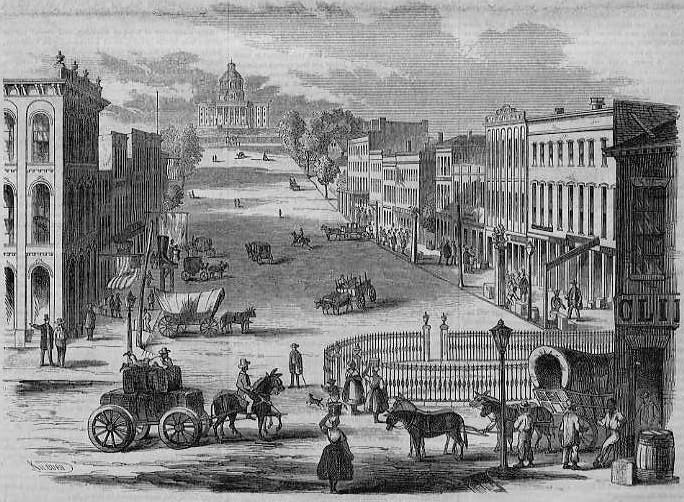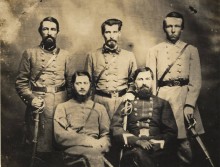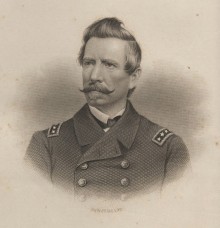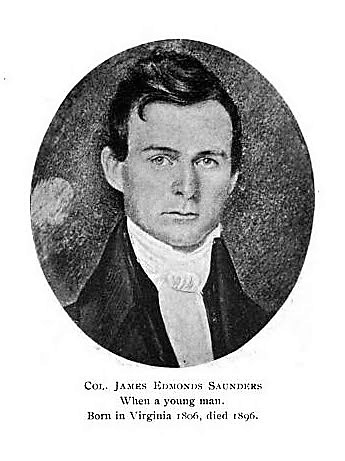Excerpt from
ALABAMA STATE CAPITOL
AN HISTORICAL SKETCH,
Brochure
by
JAMES B. SIMPSON,
Late Recording Secretary to the Governor
JANUARY 1898
Roemer Printing Co., Montgomery, Ala,, Printers
THE PEOPLE VOTE FOR REMOVAL
At the election in the fall of 1845 the people voted on these propositions and they were carried. The total popular vote for removal of the seat of government from Tuskaloosa was, 33,798, and the vote against removal was 27,320. As a result of this popular declaration in favor of removal the following bill to carry it into effect was introduced in the House of Representatives by Mr. J. C. Wilson, of Lauderdale county, January 7th 1846.
AN ACT
For the Removal of the Seat of Government from Tuskaloosa and for other purposes.
Section 1. Be it enacted by the Senate and House of Representatives of the State of Alabama in General Assembly convened, That the seat of government of the State of Alabama shall be and remain in the city of Tuskaloosa, and considered as located in said city, until a State House equal in every respect to the one now occupied by the General Assembly, is erected and completed, and fully finished, at such place as the Legislature may hereafter select, by joint ballot of the two houses of the General Assembly, free from public expense, and the keys of the same tendered and given to the Secretary of State, together with a sufficient quantity of land on which said State House shall be built.
Section 2. And be it further enacted, That within ten days after the passage and approval of this act it shall be the duty of the General Assembly to elect by joint ballot five commissioners, whose duty it shall be to examine the State House so erected, completed, and fully finished, and furnished, at the place which may be so designated, when called upon by the master builder of the same, and report within ten days after such examination to the Secretary of State, whether said new State House is equal in every respect to the one now occupied by the General Assembly.
Section 3. And be it further enacted, That if said commissioners report that the said new State House and furniture, are equal in every respect, if not superior, to the one now occupied by the General Assembly, whenever thereafter the keys of the same shall be tendered, as aforesaid, by the master builder of the same, from the day on which said tender shall be made, the seat of government of the State of Alabama, shall be considered and is hereby declared to be removed to such place as the General Assembly may hereafter select as aforesaid; and the archives of State, and all the furniture of the same, shall within three months thereafter, be removed to said new State House, free from public expense; Provided, that a good and indefeasible title to the said land shall be made and delivered to the State of Alabama, at the said time when the keys are tendered as aforesaid.
Section 4. And be it further enacted, That all laws and parts of laws contravening the provisions of this act, be, and the same are hereby repealed.
Approved, 21st January, 1846.
SELECTION BY THE LEGISLATURE
The passage of this act and its approval by the Governor opened the active campaign for the selection of the future seat of the State government. The first step, in compliance with the provisions of this act, was the selection of a location, and on the 28th of January, 1846, the Senate and House of Representatives met in joint session in the hall of the House for the purpose of making the selection.
The following is a list of cities and towns placed in nomination for the seat of government: Tuskaloosa, Wetumpka, Mobile, Montgomery, Statesville, Selma, Marion and Huntsville.
On the first ballot the vote stood: For Tuskaloosa, 39; Wetumpka, 28; Mobile, 6; Montgomery, 33; Statesville, 2; Selma, 9; Marion, 4; and for Huntsville 6.
Those who voted for Montgomery on the first ballot were: Messrs. Gilchrist, Hardaway, Kendrick, McClung, Oliver, Scott, Shorter and Ward of the Senate; and Messrs. Barnett, Bates, Bibb, Billingslea, Cooper, Cook, Ellsberry, Grady, Hobdy, Judge, Long, McGriff, Merrick, Robertson, Sanford, Shanks, Snowden, Stallworth, Stringer, Tarver, Taylor of Butler, Warren of Coffee, Watts, Williams of Henry, and J. Williams of Jackson.
The law required that it should take a majority of all the votes cast to select, and no place having received a majority, the joint session proceeded to ballot again. The ballot was kept up with varying changes until sixteen ballots had been taken when Montgomery received 68 votes, a majority of all the votes cast, and the Speaker of the House declared that Montgomery had been duly and constitutionally selected the seat of government of the State of Alabama.
SELECTION BY THE LEGISLATURE.
The passage of this act and its approval by the Governor opened the active campaign for the selection of the future seat of the State government. The first step, in compliance with the provisions of this act, was the selection of a location, and on the 28th of January, 1846, the Senate and House of Representatives met in joint session in the hall of the House for the purpose of making the selection.
The following is a list of cities and towns placed in nomination for the seat of government: Tuskaloosa, Wetumpka, Mobile, Montgomery, Statesville, Selma, Marion and Huntsville.
On the first ballot the vote stood: For Tuskaloosa, 39; Wetumpka, 28; Mobile, 6; Montgomery, 33; Statesville, 2; Selma, 9; Marion, 4; and for Huntsville 6.
Those who voted for Montgomery on the first ballot were: Messrs. Gilchrist, Hardaway, Kendrick, McClung, Oliver, Scott, Shorter and Ward of the Senate; and Messrs. Barnett, Bates, Bibb, Billingslea, Cooper, Cook, Ellsberry, Grady, Hobdy, Judge, Long, McGriff, Merrick, Robertson, Sanford, Shanks, Snowden, Stallworth, Stringer, Tarver, Taylor of Butler, Warren of Coffee, Watts, Williams of Henry, and J. Williams of Jackson.
The law required that it should take a majority of all the votes cast to select, and no place having received a maority, the joint session proceeded to ballot again. The ballot was kept up with varying changes until sixteen ballots had been taken when Montgomery received 68 votes, a majority of all the votes cast, and the Speaker of the House declared that Montgomery had been duly and constitutionally selected the seat of government of the State of Alabama.
SCATTERING VOTES.
On the 10th ballot Mr. Cobb cast his vote for Blount Springs as the seat of government of the State. On the 11th ballot Mr. Kittrell voted for Greensboro; Messrs. Perry and Rice voted for Decatur, and Mr. Smith of Franklin cast his vote on that ballot for Tuscumbia. On the 12th ballot Mr. Watrous and Mr. Hill, of Bibb, cast their votes for Maplesville.
The only places voted for on the 16th, and last ballot were: Tuskaloosa, Wetumpka, Mobile, Montgomery and Selma, and the vote stood: For Tuskaloosa, 39; Wetumpka, 9; Mobile 3; Montgomery, 68, and Selma 11.
Those who voted for Montgomery on the final and successful ballot were: Messrs. Ashe, Clarke, Falkner, Gilchrist, Griffin, Hardaway, Huey, Kendrick, McClung, McLemore, Oliver, Scott, Shorter, Smith and Ward, of the Senate, and Messrs. Allen, Austill, Barnett, Bates, Bibb, Billingslea, Bowdon, Browne, Brantley, Clay, Cobb, Cooper, Cook, Ellsberry, Fletcher, Garrett of Cherokee, Garland, Grady, Hastie, Hardwick, Holly, Bobdy, Heflin, Hill of Talladega, Judge, Kerr, Long, Mason, McElroy, McGriff, Merrick, Miller, Murphy, Norman, Owen, Robertson, Sanford, Sandidge, Shanks, Smith of Mobile, Snowden, Stallworth, Stringer, Tarver, Taylor of Butler, Turner, Walker of Benton (now Calhoun), Warren of Coffee, Warren of DeKalb, Watts, Williams of Henry, J. Williams of Jackson, and C. F, Williams of Jackson, of the House of Representatives.
The selection of a permanent seat of government having been made, the next legislative step was the selection of the commission required by the act to examine the new capital building before its acceptance by the State, and on the 30th of January the Legislature in joint session elected the following commissioners: Messrs. Abernathy, Steele, Pratt, Hooper and Clitherall.
ALABAMA FOOTPRINTS – Volume I – IV: Four Volumes in One
The first four Alabama Footprints books – Volumes 1-IV have been combined into one book
From the time of the discovery of America restless, resolute, brave, and adventurous men and women crossed oceans and the wilderness in pursuit of their destiny. Many traveled to what would become the State of Alabama. They followed the Native American trails and their entrance into this area eventually pushed out the Native Americans. Over the years, many of their stories have been lost and/or forgotten. This book (four-books-in-one) reveals the stories published in volumes I-IV of the Alabama Footprints series.





